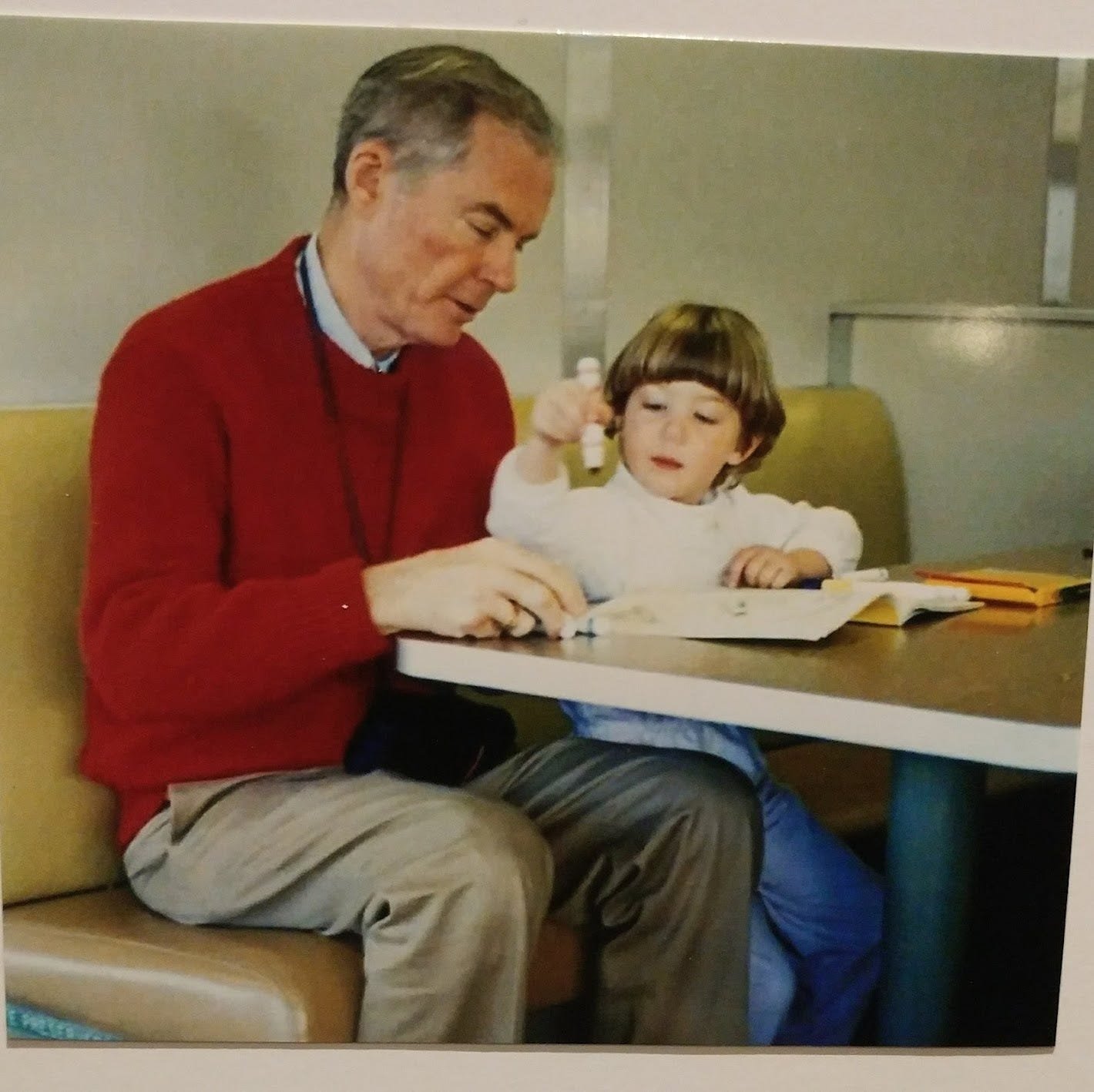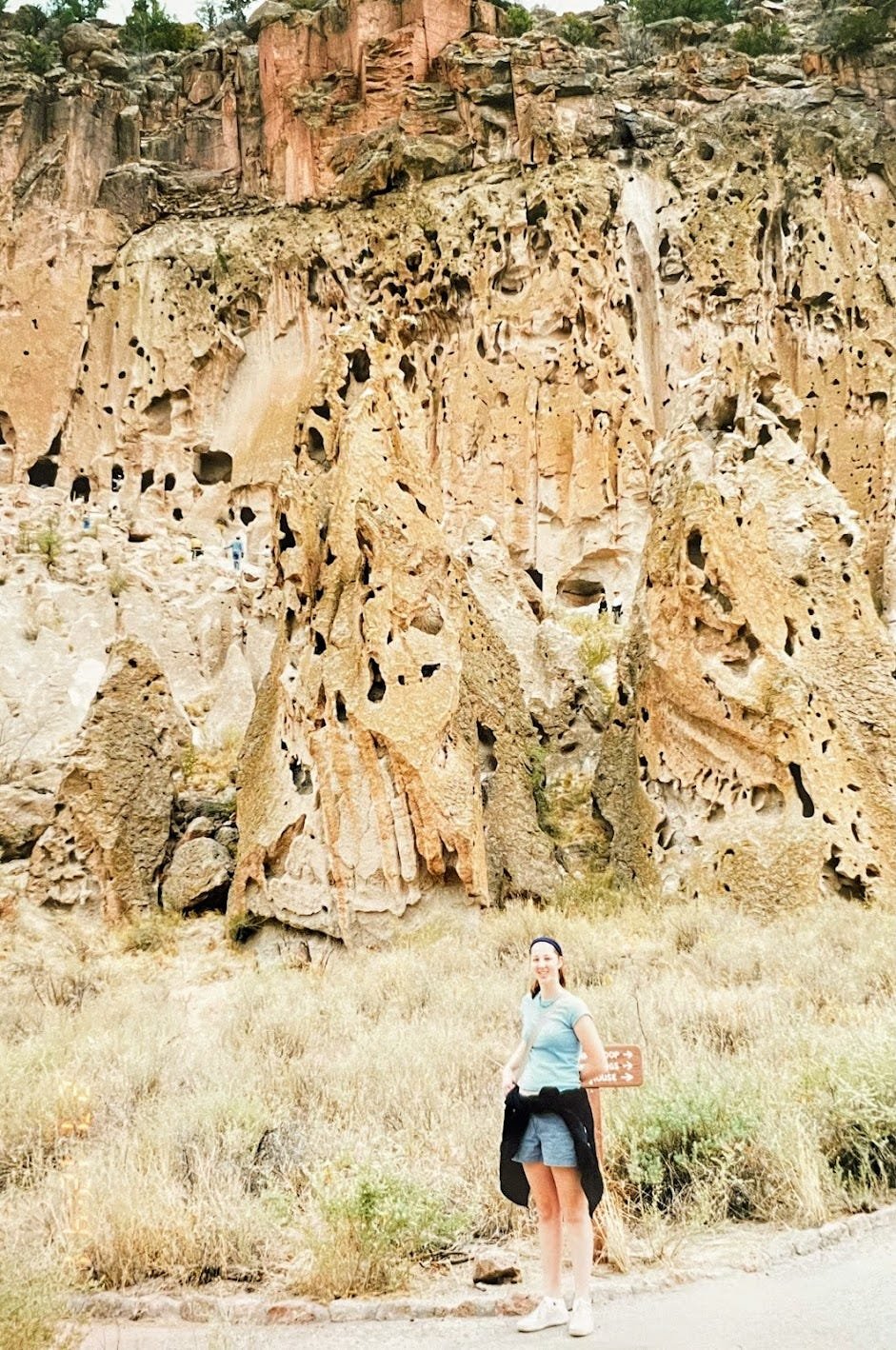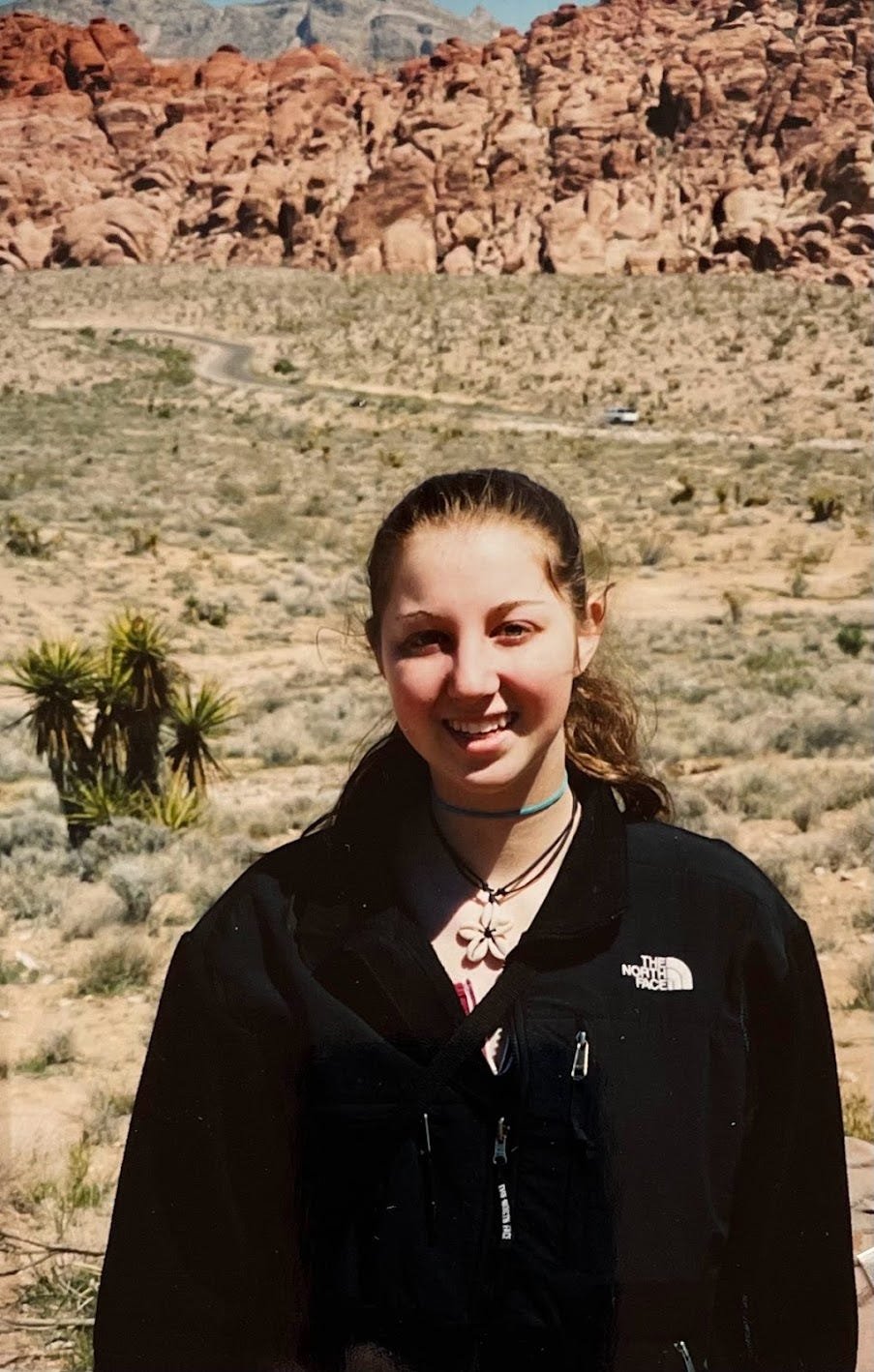That Big Kid Ellen #11: Pick out a bag of geology rocks
I consider myself a very logical person.
I consider myself a very emotional person.
This is what we call a paradox.
Because both of these statements are 100% true about me, I sometimes struggle to accept paradoxes in my life. I think most people do. To have two seemingly-opposite truths live side-by-side in your body and brain is not a comfortable thing.
Here are some examples from my life:
Grief and relief.
My grandfather’s life ended due to Alzheimers and its complications in 2019. His quality of life was minimal at the end — he couldn’t really get out of bed, speak, eat, smile, drink. I knew that he was not the grandfather that I had grown up with (I called him “grandpa 2.0” when he went to live in a memory care facility). There was a deep relief that I felt when he died because I knew that his body couldn’t sustain him anymore.
At the same time, his death annihilated my mental health. No one teaches us how to grieve. Especially not in a typical Midwestern culture. We are taught to be stoic, show no kinks in our emotional armor. To externally show emotion could make others uncomfortable, and we don’t want to do that, now do we?
But… “I consider myself a very emotional person.”
For the first month after his death, I hardly cried at all. Every time I felt the hot presence of tears in my eyes, I would angrily shake my head back and forth and will myself to not let the tears fully appear. My therapist pointed this out early on, since I’m usually quick to tears in our sessions, and I told her that I had a fear that if I were to start crying I would never stop. I imagined myself crying for an entire week, debilitating myself in the process, and also not being able to bring him back.
It was hard not to have anyone in my family to talk to about it. They seemed to do their grieving privately or, in some cases, not at all. I learned that in order to grieve alone, I had to cry. I had to scream. I had to tense all of my muscles until my body hurt and then release them at the same time. It was an intense experience. (Note: I’m still grieving his death, but it looks very different now.)
My logical self knows that people die. Sick, old people die. And my grandpa was sick and old. His death brought me some peace because I didn’t want him to suffer anymore. I wanted him to be free of his pain and physical burden. I knew that this had to happen. Logically.
My emotional self did not want him to die. I am greedy and never want death to affect me. I was upset because I didn’t feel like I had ever said goodbye to him properly (logical brain says: that’s almost impossible with folks with Alzheimers). I remember being so angry about him dying when I first found out that I screamed and yelled and shook my fist at the sunset because I didn’t understand how such beauty could exist in the light when I felt like my life had just become so dark.
Paradox: I am devastated that my grandfather died, and I am relieved that he found peace.
Grandpa 1.0 and little Ellen were bffs.
Acceptance and change.
Another paradox that I struggle with daily is holding acceptance and the desire to change together in regards to my body. Anti-diet culture and body positivity culture speak of loving your body at every size, shape, age, color, gender. My body has changed during quarantine, and will continue to change throughout my life. After years of hating and shaming my body, I started to love her this year.
I was given homework by my coach to sit in front of a mirror and scan my body, starting at the top of my head. The second a negative thought popped into my brain (“ugh, look at that pimple on my nose”), I had to start over again at the top. It took me dozens of tries before I started to look at my body with no negative thoughts. But I eventually did it. And I know that I could do it today if I tried.
At the same time, my body is bigger than it’s ever been before, and there’s a certain level of discomfort that comes with that. I’m not as flexible or strong as I once was. I can’t do some of the activities that I used to be able to do. And so I want my body to change. I want to her to change so that she can move freely through life and experience all the fun things that it has to offer.
Notice how I didn’t say that “I want to lose weight.” Previously, I would have cranked up a restrictive diet, exercised until I melted into the floor, and hated myself because I didn’t actually enjoy anything that I was doing. That is not the change that is sustainable, healthy, or kind to my body.
The kind of change that I now seek I will find in treating my body with care. I started taking yoga classes (which, for me, is so freaking weird) so that my body can move with more confidence. I started walking more instead of feeling like I have to run all the time because, newsflash, I really like walking! I want to nourish my body better and give her so many yummy foods that don’t upset her stomach or make her tired. It’s about additive, not subtractive, changes. And with all these things, change is inevitable. But the outcome isn’t a number on a scale. It’s a feeling.
Paradox: I accept and love my body right now in this moment, and I want my body to change so that she can experience more things in life.
Science and woo.
I’ve discussed this paradox a bit when I wrote about my beliefs about déjà vu. Scientifically, it’s impossible to prove the existence of souls or the afterlife or reincarnation. But it feels good to believe in them! There is safety and comfort in believing that there is more than this one, physical life.
Similarly, I know that rocks are dead. They’re just pieces of earth that don’t have a life force. But there are also a lot of people that believe that our planet is alive, that she can breath, and that rocks and gemstones are imbued with energy. I think I might also be one of those people!
The feeling that I get when I am surrounded by nature, even “dead” nature, is overwhelming. I obviously feel something powerful when I stick my hand into fertile soil and connect with plant roots and bugs and microbes. It’s why I was a professional gardener for so long.
Yet, some of the most magnificent places on earth are simply sand or rock or lava and have no living things. And yet I still feel a deep connection to those places, similar to how I feel when I am connected to people or to living nature. My throat catches when I look out over the Grand Canyon. I feel giddy when I watch lava spew out of a volcano. And I swear that my emotions and body drastically change when I rub a smooth piece of amethyst between my fingers when I’m nervous.
Could literally stare at rock formations for hours.
When I was young, we took a lot of trips around the US. So many, in fact, that I have been to 49 of the 50 states (who wants to go to North Dakota with me?!). A common thing to find when you are a tourist in this country and you visit natural sites or science museums are tubs of colorful rocks that are sold by the bagful.
When I was little, I used to be obsessed with these rocks and gems to the point where I had to purchase multiple plastic tackle boxes from The Container Store to store my growing collection. I was drawn to the bright colors of some, the speckled patterns of others, or the iridescent shimmer that stones like Tiger’s eye boasted. I felt a connection to certain ones and would place them at the top of my boxes when I would go through and rank-order them every once in a while.
Now, in my mid-30s, I’m leaning more into my Pisces tendencies and picking up on energies and psychic tendencies that the world (and rocks) have to offer. It’s still an exploration at this point, but I dug deep for this task. And I found something that I really like.
I thought that I could complete this list item by simply checking out the gift store at a museum like I would when I was a kid. When I visited the planetarium at the Cal Academy in San Francisco, I found a bin of rocks and went wild. I wanted to find the perfect collection based on color and texture, just like I had when I was younger, and spent about 5 minutes digging around until I had filled a small, black velvet bag.
It felt a little anti-climatic. I had this bag of rocks, but I didn’t know what they were or where they came from or even if they were really natural. It was a disappointing experience, and I wanted to do more before I officially checked this task off of the list.
My rock haul…
without meaning behind stones,
they felt pretty worthless.
When we got back to Austin, I decided to take a trip to a place where my husband and I had oddly had one of our earlier dates at: Nature’s Treasures — “The Biggest Metaphysical Crystal Store In The US.” This store is huge and sells a little bit of everything, from 350 million-year-old sea life fossils to minerals, crystals, home decor, salt lamps, and jewelry. There’s also a giant dragon at the front entrance that is a great for a photo opp.
When we arrived, we wandered around the giant showroom to see all of the different gemstones and crystals that they had for sale. Similar to the gift shops of yore, they had a loose rock section with stones that you could pick out individually. They also had a wall full of jewelry with explanations of what each stone offered.
Logical brain — they’re just rocks. They can’t bring you love, peace, protection, or money.
Emotional brain — But what if they could?
At the back of the store, there is a space for a psychic practitioner to do readings and consultations. I have only ever had my tarot cards read over a Zoom call or by friends, so I decided that an in-person session might be fun. I introduced myself to the psychic, Deborah, and we began the reading.
She first asked me to get into touch with my higher self by taking a few deep breaths. She told me to think about breathing in light and breathing out negative energy as if they were dust particles. I did this a couple times and closed my eyes. Then she said to ask my higher self a question, that my higher self will feel when I was ready to truly look inwards. Something immediately floated to the front of my brain (so cool).
“How can I gain confidence and feel more secure being my authentic self?”
Deborah nodded and said that was excellent (I was afraid it was too vague). She wanted to pull a single tarot card to ground her reading and so that we could get more specific on what to discuss. She took out an iPad and pulled up a virtual tarot card app (a little non-personal, but it didn’t take the fun out of it). She touched the screen and flipped over a card. I almost audibly gasped.
The “hostilities” card had appeared. I understand that most of us feel hostilities on any given day, whether it be at work or with one of our many relationships, so this card could have been true for just about anyone that walked in the door (says the logical brain). However, this card was especially timely for me because my husband and I had just had a pretty big argument and it was weighing on me very heavily. So yeah, it felt pretty darn spot-on. I tried to hide my enthusiasm.
Deborah talked about how I have been told over and over that I am “too sensitive” and that I need to set better boundaries with my emotions as well as not take on the emotional burden of others. Yes, yes, go on.
She asked my gods (guides? I might have misheard her) if I was a natural-born empath, and they told her no. But she emphasized that I am empathetic and I need to be careful with that. She went into depth about how to protect myself and build confidence and set boundaries. She mentioned pink yarrow, which is a flower essence, and how to drink it. Then she also gave me this psychic protection affirmation.
I call upon the legions of Archangel Michael, Destroyer Angels, and Circle Society to place a triple grid with mirror shield around me now and ask them to escort any misqualified energies and entities to their right and perfect place. I now fill my aura with the violet flames of divine love.
Intense, amirite?
The rest of the time we spent together was a bit therapy-esque. She went on to tell me that in order to have more confidence in myself I need to focus on redirecting energy that is not meant for me. She said that energy isn’t actually positive or negative, just misplaced, and certain energies can hurt us if they are not ours to take on. It really hit home the point that any judgements made about me by someone else were not my problem to solve.
After she was done, I felt a sense of giddiness. There was direct action I could take from this conversation, even if the woo factor was off the charts. I needed to protect my energy and set better boundaries. I went back over to the wall with all of the stones and jewelry and chose two bracelets based on her reading (and what I was naturally drawn to).
So many think to touch and play with.
Little kid Ellen was having a field day.
Tourmalinated quartz — Grounding. Grounding stone. Effective problem solver. Turns negative thoughts and energies into positive.
Amazonite — Creativity. Confidence, practical think and creativity. Brings hope and increases self-esteem.
I also wanted some loose stones so I found a mini energy set that focused on Joy & Bliss.
Citrine — Joy. Sunshine and positivity in crystal form! Encouragement to feel strong in your power, brilliance, and creativity while tapping into the abundance of the universe.
Labradorite — Bliss. Place on the third eye chakra to access your intuition and inner magic! Connects you to the present moment with clarity and releases attachments to old habits.
Here’s the paradox: I know that rocks don’t have a life force or energy inside of them, and I know that when you believe that rocks have energy, that type of energy arises.
Little kid Ellen believing in the power of fairy dust.
It’s fun to believe that wearing a bracelet will bring me more self-esteem. It might be from the rock itself or it might be because I feel better about myself because I tapped into my creative side and am wearing something pretty. It doesn’t mean that science can’t be true or that I’ve gone full hippy lady. I’m drawn to healing crystals and tarot card readings because when I am thinking about those things, I am reflecting on how I am feeling, I am more connected to my emotions and my body, and I am having fun. And that is what’s truly important to me.
To finish this post, I’ll end with a final thought on paradoxes. I recently listened to a podcast where Brené Brown interviewed president Barack Obama where they discussed the importance of paradoxes.
Barack Obama: It is both possible and necessary to see the paradoxes, the ambiguities, the gray areas, the absurdities sometimes, of life, but not be paralyzed by them… The danger in being able to see paradox is paralysis of analysis.
Brené Brown: This skill about the transformative power of holding opposites, knowing that two things that feel competing and conflicting can both be true, and how the ability to straddle these kind of paradoxes, really leads to transformation… That rare skill of holding the tension of opposites makes us better leaders, partners, and parents.
I am going to hold the paradoxes of life gently and firmly (see what I did there?) and allow them to co-exist so that I can experience their transformational powers. What kind of paradoxes will you accept in your life?
Click to see all blog posts: That Big Kid Ellen









